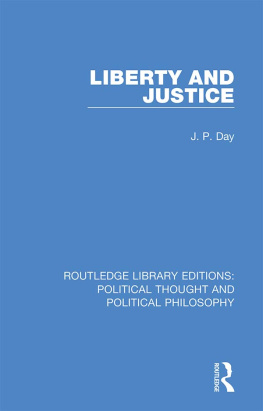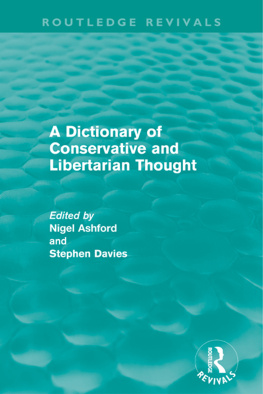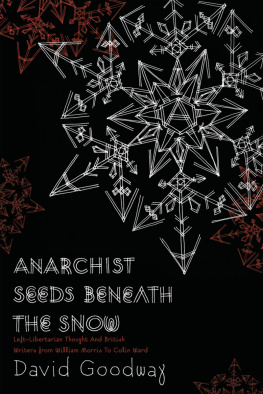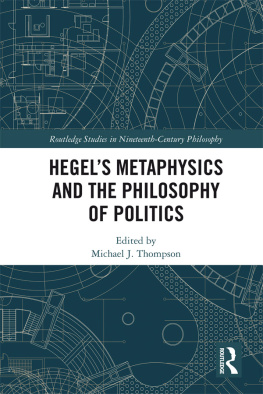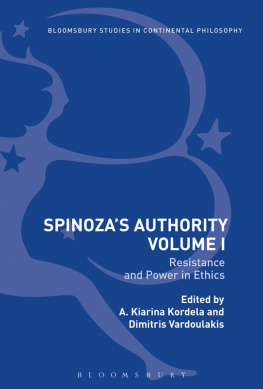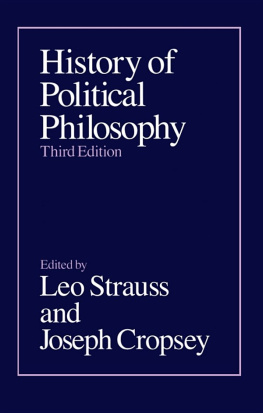First published in 1987
by Garland Publishing, Inc.
This edition first published in 2017
by Routledge
2 Park Square, Milton Park, Abingdon, Oxon OX14 4RN
and by Routledge
711 Third Avenue, New York, NY 10017
Routledge is an imprint of the Taylor & Francis Group, an informa business
1987 William Russell McKercher
All rights reserved. No part of this book may be reprinted or reproduced or utilised in any form or by any electronic, mechanical, or other means, now known or hereafter invented, including photocopying and recording, or in any information storage or retrieval system, without permission in writing from the publishers.
Trademark notice : Product or corporate names may be trademarks or registered trademarks, and are used only for identification and explanation without intent to infringe.
British Library Cataloguing in Publication Data
A catalogue record for this book is available from the British Library
ISBN: 978-1-138-69658-7 (Set)
ISBN: 978-1-315-52405-4 (Set) (ebk)
ISBN: 978-1-138-68034-0 (Volume 5) (hbk)
ISBN: 978-1-138-68037-1 (Volume 5) (pbk)
ISBN: 978-1-315-56380-0 (Volume 5) (ebk)
Publisher's Note
The publisher has gone to great lengths to ensure the quality of this reprint but points out that some imperfections in the original copies may be apparent.
Disclaimer
The publisher has made every effort to trace copyright holders and would welcome correspondence from those they have been unable to trace.
Foreword
Nineteenth-century libertarian political thought encompasses a wide variety of ideas in the works of a heterodox and often quarrelsome group of writers. What unites them, despite their many differences, is their rejection of state coercion as a morally permissible basis of government and their belief in the inherent capacity of human beings to live fulfilling lives as autonomous individuals, guided by their conscience and free from the dictates of institutional authorities. They reject the claim that they have an obligation to obey those who presume the right to rule over them, and regard the instruments of surveillance, control and manipulation that those authorities use to exert their rule as illegitimate and immoral.
Today, in the in the early decades of the twenty-first century, even in what had once been liberal democracies there is constant stoking of public fear of terrorism, crime, or some other currently dreaded menace and relentless pressure on citizens to trade their personal freedom for the supposed benefits of enhanced security. At the same time, state and corporate authorities are in possession of technologically advanced instruments of surveillance that enable them to monitor and control human activity to a degree never before possible. Little wonder, therefore, that there is a revival of interest in libertarian thought.
Will McKercher came early to the realization that writers in the libertarian tradition raised profound questions about the ethical foundations of political order and that their ideas remain as challenging and relevant as when they were written. His thinking first found expression in his brilliant 1971 masters thesis at the University of Western Ontario, titled simply Obedience in Anarchism. In it he focused principally on the works of the anarchist-socialists Alexander Berkman and Emma Goldman, but also wove into his discussion sharply insightful observations on the works of Tolstoy, Kropotkin, Proudon and others. I was privileged to be one of Wills teachers at that stage of his career, but in truth my role was an easy one: his remarkable talent for lucid exposition and analysis and his fluid, direct, first-person writing style were already in place and fully formed.
In his doctoral research at the LSE his interest turned in a new but related direction, away from the anarchist-socialist school of theorists and towards a rich but under-studied vein of nineteenth-century English political thought which he eventually defined as libertarian rather than anarchist. That body of writing incorporated a broader range of ideas than that found in anarchist thought and included works by authors whose views of anarchism were ambiguous and often contradictory. The task he set for himself was to characterize and identify the intellectual heritage of the proponents of the libertarian tradition, and in particular to elucidate their understanding of the concepts of freedom and authority. The result was a study distinguished by extraordinary depth of research and masterful exposition perhaps best exemplified in his discussion of the works of William Morris, which alone is a noteworthy contribution to original scholarship.
Today, the label libertarian has been largely appropriated by a school of theorists whose philosophy is on the opposite end of the ideological scale from that of the nineteenth-century anarchists and libertarians who were all, in one way or another, on the political left. Right-wing libertarianism has intellectual roots that may be traced to the writings of Friedrich Hayek, Ludwig von Mises and other economists of the Austrian school, and has been widely popularized by modern American advocates, including, most notably, the philosopher Robert Nozick. While divided over certain matters, the core belief of right-wing libertarians is that freedom can only be fully realized under a system of unregulated free-market capitalism, with a minimal state whose functions are limited to little more (or nothing more) than protecting private property and enforcing contracts. Their narrow construction of liberty leaves no room to consider the consequences of extreme inequality or structures of economic domination that such a system would inevitably generate.
The re-issue of William R. McKerchers Libertarian Thought in Nineteenth Century Britain is a timely reminder that there is an older, alternative tradition of left-libertarian thought that now, perhaps more than ever, deserves our most serious attention. Readers of this book will find themselves treated to a guided tour through the literature of that tradition by a scholar who is deeply engaged with his subject and who approaches it in a manner that is unfailingly respectful and sympathetic but by no means uncritical. There is much that is original and thought-provoking in the following pages. Read on and enjoy.
Sid Noel
London, Ontario, 2016


